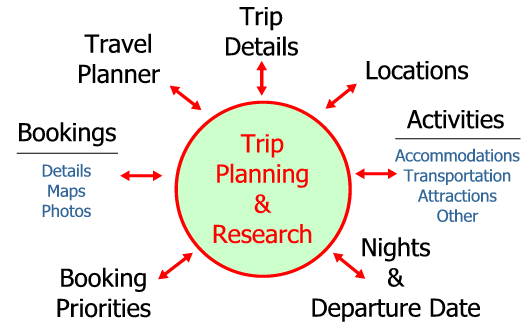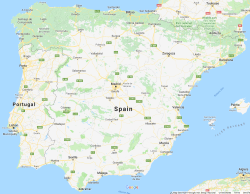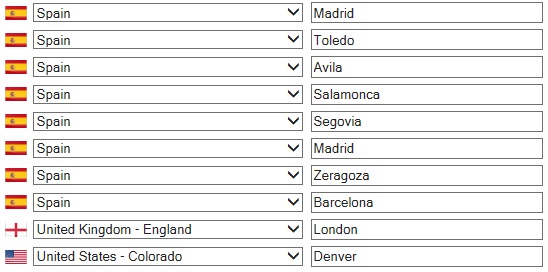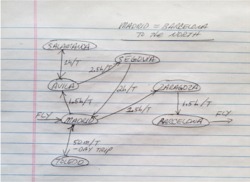Here we walk you through an example of planning and researching trips through Portugal and Spain.
|
This first step is extremely important and you should spend as much time as necessary to be sure you have found the locations you want to visit, the best travel routes and are aware of all there is to see and do. The more time you take, the better off you will be, so don't rush through this step. You don't want to take your trip and return home to find you missed something extremely important at a site you were visiting or another site close by. | ||||||||||||
The diagram below shows the interactive process of Trip Planning & Research.

Step 1: Determine locations based on activities of interest
You will be researching locations and activities to create a list of possible places to visit along with activities at those locations.
Make note of transportation options, travel times and in some cases the cost to travel between locations. Once you have solidified a list of locations and activities, you will use your best guess to determine the amount of time required at each location. Some locations may be considered day-trips, while others will require an overnight stay or a stay of several nights.
When you are considering a trip, the sky is the limit. We are using Portugal and Spain in this example. Start by listing every location of interest. Research sites by reading, watching videos and using the internet. Search for things such as 'popular Spanish destinations', 'Spanish castles', 'medieval towns of Portugal', etc. When you find something that interests you, write the location down and make note of the site or activity. At this point, don't be concerned with the cost or transportation between locations. Later in the process, when you have gathered more information, you will be able to make more informed decisions on the locations you will actually visit and ones you will remove.
| Map of Portugal & Spain | |
|
As you
begin writing down the
locations you are
considering to visit, it's important to
write them in the general proximity to the actual
locations on the map.
This will give you a
representation of their
geographical position and
direction of travel. (See
the first handwritten page
below) Google Maps: Portugal & Spain |
 |
Step 2: Sites of interest and activities
Once you have listed your locations of interest, make note of the sites and activities for each location. You can write them down next to each location on your handwritten map but a better idea may be to list them on a separate piece of paper as your map will more than likely become very congested as you begin connecting locations and adding travel information in the next step.
Activity research should also include
- If applicable, accommodation availability/affordability/location (makes sure you can easily reach your accommodations from your arrival point, that it's convenient to your planned sites and activities and it fits your travel budget)
- If you are traveling by train, note the arrival and departure locations
- If arriving by car, note parking areas and cost
Step 3: Connecting the dots - travel mode, time and cost
In this step, you will draw lines connecting the logical possibilities of travel between locations.
Use an internet search to find travel information between your locations such as 'Madrid to Toledo'. Along each line of travel, make note of the travel mode, time and cost if necessary. For example, along the line connecting Madrid to Toledo line write: 50min./Train.
From your research in Step 2, you should have made note that the train arrival point in Toledo is below the town and requires a somewhat long uphill walk or a taxi ride to the city center.
Having this single high-level and comprehensive view of your locations with travel times allows you to quickly see the different travel options at a glance allowing you to more easily refine your routes. You will be able to make decisions on when to backtrack through a location to get to your next destination rather than going directly from your current location. In some cases, it may actually be quicker to backtrack to a place that has a high speed train rather than making multiple connections or taking a slow city train from your current location. You may see that travel between two points does not makes sense by train or bus due to the duration and that flying is your best option.
Travel between points may only be available by bus so you need to consider the time. If you plan on traveling by car, plan on $100/day average for car rental with full insurance coverage. It may make sense to pick up a car in one location and drop it off in another but there may be additional fees for this. See our tips page on Automobiles and other transportation options.
You may find that you plan to stay several nights in one location, while at other locations you may only stay a single night. You may choose to depart early in the morning for a daytrip to a new location, returning to your original location or on to a new location in the evening. The important thing to remember is to maintain a good balance of location-time verses travel-time.
Utilizing our Travel Planner, you can easily see a breakdown of your travel time for your entire trip as well as the amount of time you will spend at each location. As you are planning your trip, consider the location, sites and travel time to determine if it's worth taking the time to get there.
I our example below, we were thinking about traveling to the Olite Castle as it looked very interesting and would be a fun place to explore. This would have been a day trip from Zaragoza requiring us to travel approximately 4 hours round trip total, just to see the castle. We decided a better use of our time would be to stay in Zaragoza, rather than spend an additional 4 hours traveling.
There are always exceptions. There are times when the site outweighs the travel time to get there, such as going to see the Taj Mahal in Agra India. You may travel several hours in a single day just to see it, but it's something you don't want to miss.
Step 4: How long to stay
Once you have solidified your trip itinerary and are happy with all you plan to see and do, it's time to estimate the amount of time required at each location to accomplish your activities. This is where you must use your best guess or judgment. At some locations you may want to relax and take your time while at others you may want to only spend a few hours and then be on your way. It's important to remember not to rush but to take time and enjoy where you are and what you are doing.
Consider your arrival time and the length of time required to travel to your next destination to determine the amount of time to stay. For example, if you arrive in the morning and have all day to explore, you may only want to stay a single night. If you arrive late in the evening, you may need to stay two nights so that you have a full day to explore. If you plan on arriving at your next location by a specific time, this may limit the amount of time you have at the current destination.
Determining the length of stay at each location will give you an idea of how many days will be required for your trip and any adjustments you need to make.
Step 5: The Trip Builder
When you are satisfied with your trip, you can being transferring your information to the Trip Builder.


 As this example shows our
handwritten planning notes, please
excuse our misspelling of Gibraltar.
As this example shows our
handwritten planning notes, please
excuse our misspelling of Gibraltar.


